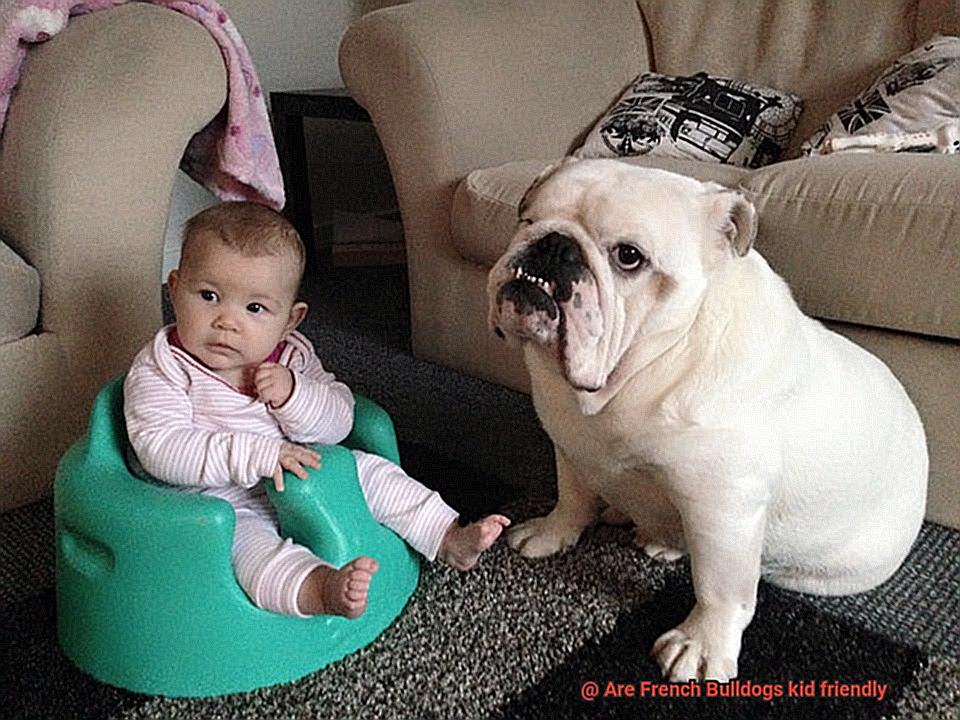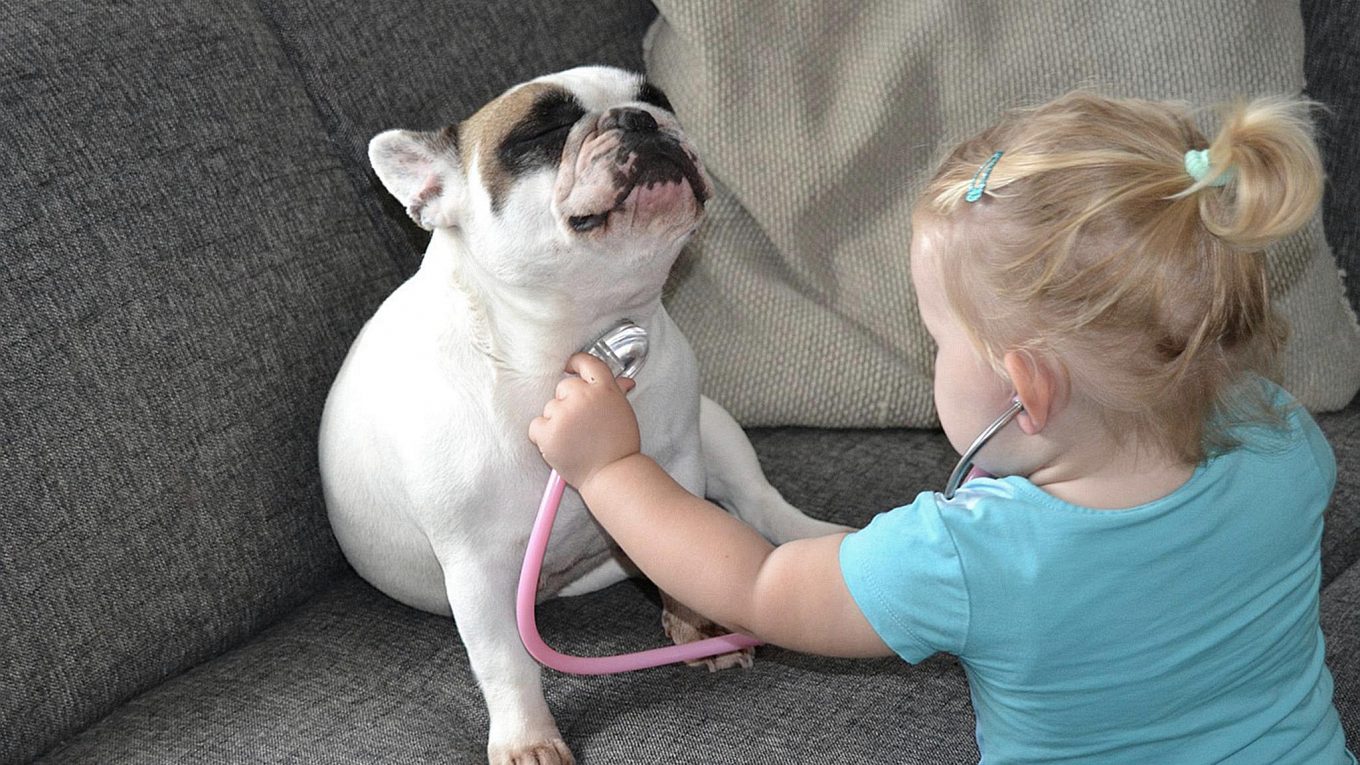Are French Bulldogs kid friendly?
Picture this: your little ones squealing with delight as they welcome a furry friend into your family. But hold on a second—before you dive headfirst into the world of French Bulldogs, let’s address the burning question: are these adorable squishy faces truly compatible with our pint-sized humans?
Today, we’re embarking on an adventure to debunk myths, uncover tail-wagging facts, and determine if French Bulldogs are the perfect fit for your family’s “paw-some” journey.
So, grab a cuppa and settle in as we explore the kid-friendly potential of these lovable companions. Let’s get this show on the road, shall we?
The Benefits of Having a French Bulldog in a Family Home
Contents
- 1 The Benefits of Having a French Bulldog in a Family Home
- 2 How to Ensure Safety When Interacting with Children and French Bulldogs
- 3 Early Socialization and Training for French Bulldogs
- 4 Are French Bulldogs Good Companions for Families With Kids?
- 5 Understanding the Temperament of a French Bulldog
- 6 How to Teach Your Child to Properly Interact With a French Bulldog
- 7 What is the Ideal Exercise Level for a French Bulldog in a Family Home?
- 8 Factors That Contribute to the Kid-Friendliness of French Bulldogs
- 9 Conclusion
When it comes to finding the perfect family pet, French Bulldogs are often at the top of the list. With their friendly nature, adaptability, and low maintenance requirements, these lovable pups bring joy and companionship to any household. In this blog post, we’ll explore the numerous benefits of having a French Bulldog in your family home.
Kid-friendly Companions:
French Bulldogs are known for their patient and tolerant attitude towards children. They form strong bonds with kids and make excellent playmates. Their gentle and protective nature ensures the safety and well-being of your little ones.
Adaptability:
Whether you live in a small apartment or a spacious house, French Bulldogs can easily adjust to different living environments. They are well-suited for families in urban areas where space may be limited.
Low Exercise Requirements:
Unlike some high-energy breeds, French Bulldogs have relatively low exercise needs. While they enjoy short walks and playtime, they don’t require extensive physical activities. This makes them ideal for busy families who may not have the time or energy for long walks.
Low Maintenance Grooming:
French Bulldogs have short coats that require minimal brushing, reducing the time and effort needed for grooming compared to other breeds. This is especially beneficial for families with young children who may not have the patience for elaborate grooming routines.
Good Temperaments:
French Bulldogs are generally known for their calm demeanor and friendly personalities. They are not prone to aggressive behavior, making them a safe choice for families with children. They also get along well with other pets in the household.
How to Ensure Safety When Interacting with Children and French Bulldogs
When it comes to the interaction between children and French Bulldogs, safety should always be a top priority. While French Bulldogs are generally known for their friendly and gentle nature, it is important to remember that both children and dogs can be vulnerable in certain situations.
By following some simple guidelines and ensuring proper supervision, you can create a safe and loving environment for both your child and your furry friend.
Supervision is Key:
Always have an adult present when children and French Bulldogs are together. An adult can monitor the interaction and intervene if necessary, ensuring that both the child and the dog are safe. This is particularly important when the child is very young or if the French Bulldog is still a puppy.
Teach Proper Approach and Handling:
Teach your child to approach a French Bulldog calmly and slowly, without sudden movements or loud noises. This will help the dog feel more comfortable and reduce the risk of any negative reactions. Encourage your child to ask for permission before petting or playing with the dog, as this will teach them to respect boundaries.
Avoid Rough Play:
French Bulldogs are not built for rough play, so it’s important to teach your child to play gently with them. Discourage any pulling on the dog’s ears, tail, or any other body parts, as this can cause pain and distress. Instead, encourage gentle petting and interactive play with appropriate toys.
Respect Mealtime and Rest:
Teach your child not to disturb a French Bulldog while it is eating or sleeping. Dogs can become protective of their food or space during these times, so it’s best to give them some space. Set clear boundaries with your child and make sure they understand the importance of respecting the dog’s needs.
Recognize Signs of Discomfort:
Educate your child about the signs of discomfort or stress that a French Bulldog may exhibit. These signs can include growling, barking, or trying to move away. Teach your child to recognize these signals and give the dog space if it shows any signs of discomfort.
Early Socialization and Training for French Bulldogs
Well, you’ve come to the right place. In this blog post, we’ll dive into the importance of early socialization and training for French Bulldogs to ensure they become the best buddies with your children. So, let’s jump right in.
Early Socialization is Key
French Bulldogs may be small in size, but their personalities are larger than life. To ensure they develop positive behaviors around children, early socialization is crucial. By exposing your Frenchie to different environments, people, and situations, you’re helping them become familiar with all the excitement that comes with having kids around.
Supervision is a Must
When it comes to the initial stages of socialization between French Bulldogs and children, supervision is essential. Keeping a watchful eye ensures the safety of both parties and allows you to address any potential issues promptly. And hey, teaching your little ones how to interact with dogs properly, like not tugging on their ears or tail, can go a long way in fostering a harmonious bond.
Training for Good Behavior
Just like kids need some guidance, French Bulldogs do too. Basic obedience training is key to ensuring your Frenchie behaves well around children. Teaching them commands like sit, stay, and come can help you keep their behavior in check. And remember, positive reinforcement is the name of the game. Treats and praise work wonders in motivating your furry pal to showcase those desirable behaviors.
Consistency is the Secret Ingredient
Consistency is key when training French Bulldogs. Establishing clear rules and boundaries helps them understand what’s expected of them during interactions with children. By reinforcing these rules consistently, you’ll help your Frenchie develop good manners and prevent any potential issues from arising. Woof hoo.
Physical Contact Matters
French Bulldogs, just like any dog, need to get used to physical contact with children. So, make sure to expose them to gentle petting, hugging, and brushing from an early age. This way, your Frenchie will be all tail wags when your little ones want to give them some love.
Are French Bulldogs Good Companions for Families With Kids?
With their adorable wrinkled faces, bat-like ears, and playful personalities, they make excellent companions for families with kids. In this section, we’ll explore the many reasons why French Bulldogs are a great choice for families with children.
Friendly and Affectionate Nature
One of the key reasons why French Bulldogs make such great companions for families with kids is their friendly and affectionate nature. These dogs love being around people and thrive on human companionship. They will quickly form strong bonds with children and become their constant companions, providing them with love, comfort, and endless entertainment.
Playful and Energetic
French Bulldogs have a playful and energetic personality that matches well with the energy levels of children. They love to play games, chase toys, and engage in fun activities with their human family members. Whether it’s a game of fetch in the backyard or a silly dance party in the living room, Frenchies are always up for some fun with the kids.
Patient and Tolerant
French Bulldogs are generally patient and tolerant, making them suitable for households with young kids who may not always handle them gently. While it’s important to teach children how to interact respectfully with dogs, Frenchies are known for their ability to handle the sometimes clumsy and rough behavior of young children. This makes them an ideal choice for families with kids of all ages.
Good with Other Pets
If you have other pets in your household, French Bulldogs are generally good at getting along with them. They have a friendly disposition towards other animals and can happily coexist with cats, rabbits, or even other dogs. This makes them a great choice for families who already have furry friends at home.
Small Size
French Bulldogs are small in size, which makes them easier to handle for younger children. Their compact stature reduces the risk of accidents or injuries that can occur when dealing with larger, more energetic dogs. This makes them a safer choice for families with small children who may not have the strength or coordination to handle a larger breed.
Exercise and Mental Stimulation

While French Bulldogs may not be as active as some other breeds, they still require regular exercise and mental stimulation. This can be a great opportunity for families to engage in activities together. Going for walks, playing fetch in the park, or even setting up an obstacle course in the backyard can provide both physical exercise and mental stimulation for your Frenchie and your children.
Training and Socialization
Proper training and socialization are important for any dog, including French Bulldogs. Teaching children how to interact respectfully with the dog and establishing boundaries can help create a harmonious relationship between them. It’s important to supervise interactions between young children and dogs at all times, regardless of breed, to ensure the safety of both the child and the dog.
Understanding the Temperament of a French Bulldog
If you’re considering getting a French Bulldog as a family pet, it’s important to understand their temperament and how it affects interactions with children. French Bulldogs are known for their friendly and affectionate nature, making them a popular choice for families with kids. However, there are a few key things to keep in mind to ensure a harmonious relationship between your Frenchie and your little ones.
Tolerance and Patience
French Bulldogs are generally very tolerant and patient with children. They have a calm and easygoing demeanor, which makes them well-suited for family environments. Frenchies are known to be good with kids of all ages, from toddlers to teenagers. They often form strong bonds with children and can become loyal and protective companions.
Adaptability
Another important aspect of a French Bulldog’s temperament is their adaptability. They are adaptable to different living situations and can thrive in both small apartments and larger homes. This makes them a suitable choice for families living in urban areas where space may be limited. Frenchies are also known to be adaptable in terms of energy levels. While they can be playful and energetic, they are also content with lounging around the house and cuddling with their human family members.
Sociability

French Bulldogs are naturally sociable dogs. They are typically friendly towards strangers, including children they meet for the first time. Frenchies have a natural tendency to seek attention and affection from people, which makes them eager to interact with kids. However, it is still important to supervise interactions between a French Bulldog and a child to ensure the safety of both parties.
Training and Socialization

Like any breed, proper training and socialization are crucial for French Bulldogs. While they are generally not aggressive dogs, early socialization and obedience training can help establish boundaries and prevent any potential issues. Teaching them basic commands such as sit, stay, and leave it can go a long way in ensuring they develop good manners and behavior around children.
Physical Limitations
It is important to note that French Bulldogs have certain physical limitations that can affect their interactions with children. Their short noses and flat faces make them prone to respiratory problems, which can be exacerbated by excessive exercise or exposure to heat. Therefore, it is important to monitor their activity levels and ensure they have access to cool and well-ventilated areas. Additionally, due to their compact size and relatively low weight, it is important for children to handle French Bulldogs with care to avoid accidentally injuring them.
How to Teach Your Child to Properly Interact With a French Bulldog
Well, if you’re considering a French Bulldog, you’re in for a treat. These cute and cuddly pups are known for their friendly nature and love for kids. But before your child jumps into a slobbery adventure, it’s important to teach them how to properly interact with these adorable furballs. Let’s dig in.
The Importance of Doggie Etiquette:
Just like humans, dogs have their own language. We need to teach our little ones how to understand and respect it. French Bulldogs are gentle, but they still deserve proper manners from kids. Encourage your child to ask permission before approaching a dog and to approach slowly, avoiding sudden movements that might scare or startle the pup.
Buddy Up with Supervision:
Even though French Bulldogs are generally good-natured, accidents can happen. Always supervise your child’s interactions with your furry friend, especially in the beginning. This ensures both parties stay safe and any potential issues can be addressed promptly.
Decoding Doggie Body Language:
Teach your child to become a “dog whisperer” by reading a French Bulldog’s body language. Show them how to look for signs of happiness or discomfort. A wagging tail and relaxed body indicate a happy pup, while a stiff posture or growling might mean they need some space.
Petting Protocol:
Time for some belly rubs. Teach your child how to properly pet a French Bulldog by approaching from the side and gently stroking their back or chest. Remind them not to pull on ears or tails, as this can cause discomfort or pain for the dog.
Respect Personal Space:
Just like us, dogs enjoy their alone time too. Teach your child not to bother a French Bulldog while they’re eating or sleeping. Dogs can become protective of their space and might react negatively if disturbed during these times.
Safety First:
If your child ever feels scared or uncomfortable around a French Bulldog, encourage them to calmly walk away and seek an adult’s help. It’s important for children to feel safe and secure when interacting with any dog.
What is the Ideal Exercise Level for a French Bulldog in a Family Home?
French Bulldogs may not be the most energetic breed, but they still require regular exercise to maintain their overall health and prevent obesity. Finding the ideal exercise level for your French Bulldog in a family home is essential to ensure they lead a happy and balanced lifestyle. Let’s dive into the key factors to consider when determining the perfect exercise routine for your furry friend.
Moderate Daily Activity
French Bulldogs are not known for their athleticism or endurance. A moderate amount of daily activity is usually sufficient to keep them healthy and happy. This can include short walks around the neighborhood, playtime in the backyard, or interactive indoor games. Aim for at least 30 minutes to an hour of exercise each day, broken down into smaller sessions.
Consider Temperature Sensitivity
French Bulldogs are sensitive to extreme temperatures, especially heat. It’s crucial to limit exercise during hot weather to prevent overheating and potential heatstroke. Provide ample shade, carry water during walks, and avoid peak heat hours. On the other hand, extreme cold temperatures can also pose a challenge for Frenchies due to their short coats. Investing in winter attire like sweaters or jackets can help keep them warm during outdoor activities in chilly weather.
Tailor Exercise to Individual Needs
Every French Bulldog is unique, with varying energy levels and exercise requirements. Some may have more energy and need slightly more exercise, while others may be more sedentary and require less physical activity. Observe your Frenchie’s behavior and adjust the exercise routine accordingly. A professional dog trainer or veterinarian can provide guidance based on your dog’s specific needs.
Mental Stimulation Matters
In addition to physical activity, mental stimulation is crucial for a French Bulldog’s overall well-being. Engage them in puzzle toys, obedience training sessions, or interactive playtime that challenges their minds. This will help prevent boredom and ensure they stay mentally sharp.
Age and Health Considerations
Age and health conditions should also be taken into account when determining the ideal exercise level for your French Bulldog. Puppies may have more energy and require shorter bursts of playtime throughout the day, while older dogs may benefit from leisurely walks or gentler exercises. Consult with your veterinarian to ensure your Frenchie’s exercise routine aligns with their age and health condition.
Factors That Contribute to the Kid-Friendliness of French Bulldogs
French Bulldogs are often described as affectionate, friendly, and good-natured dogs. They have a reputation for being excellent family pets, and their compatibility with children is one of the factors that contribute to their popularity. However, it is important to consider certain factors when determining whether French Bulldogs are suitable for families with kids. Let’s dive into some key factors that make French Bulldogs kid-friendly.
- Temperament: French Bulldogs have a calm and easygoing nature, making them well-suited for households with children. They are patient and tolerant, which means they are less likely to become easily agitated or aggressive towards kids. Their sociable nature also means they enjoy the company of both adults and children, making them great companions for kids of all ages.
- Size: French Bulldogs are small to medium-sized dogs, weighing between 16-28 pounds on average. Their compact size makes them easier to handle for children, especially younger ones who may not have the strength or coordination to handle larger breeds. They are less likely to accidentally knock over or overpower young children during playtime.
- Training and socialization: Proper training and socialization are crucial in ensuring that French Bulldogs behave appropriately around children. Early socialization helps them develop good behavior and understand boundaries, reducing the risk of any accidental injuries or conflicts. Obedience training also ensures that they listen to commands and can be easily managed around kids.
- Individual personalities: While French Bulldogs generally have a friendly and gentle disposition, individual personalities can vary. Some may have a higher prey drive or be more reserved around strangers, which can influence their behavior around children. Spending time with the specific dog you are considering adopting or purchasing is essential to assess its compatibility with children.
YmNTJKu_7uw” >
Conclusion
In conclusion, French Bulldogs can indeed be kid-friendly companions.
They have a gentle and affectionate nature that often makes them great playmates for children. Their small size also means they are less likely to accidentally knock over or intimidate young kids.
Additionally, French Bulldogs are known for their patience and tolerance, which is essential when interacting with energetic little ones. However, it’s important to remember that every dog is an individual, and proper socialization and training are key to ensuring a positive relationship between a French Bulldog and children.
Always supervise interactions between your Frenchie and kids, teach kids how to properly interact with dogs, and provide a safe and comfortable environment for both parties.




